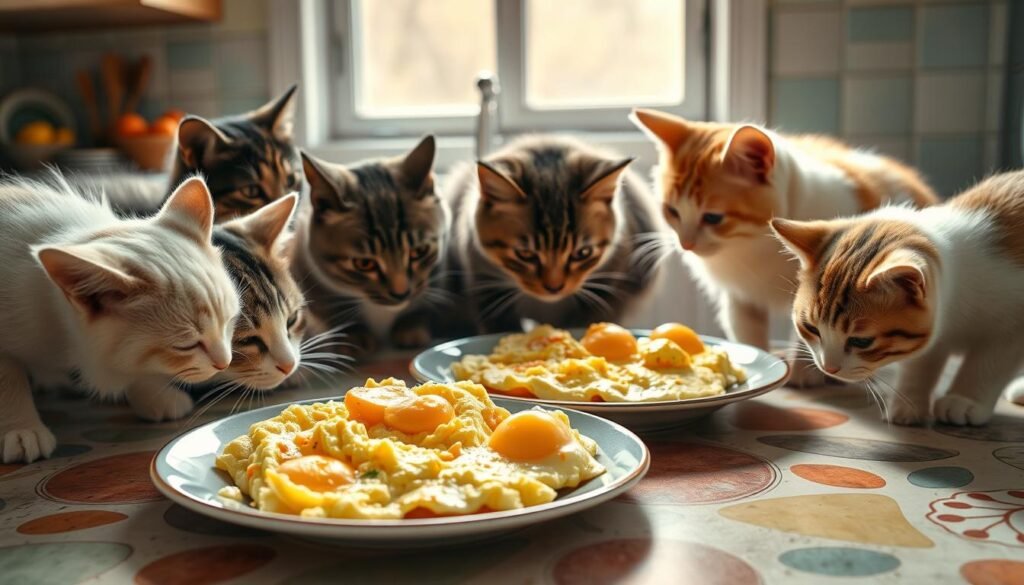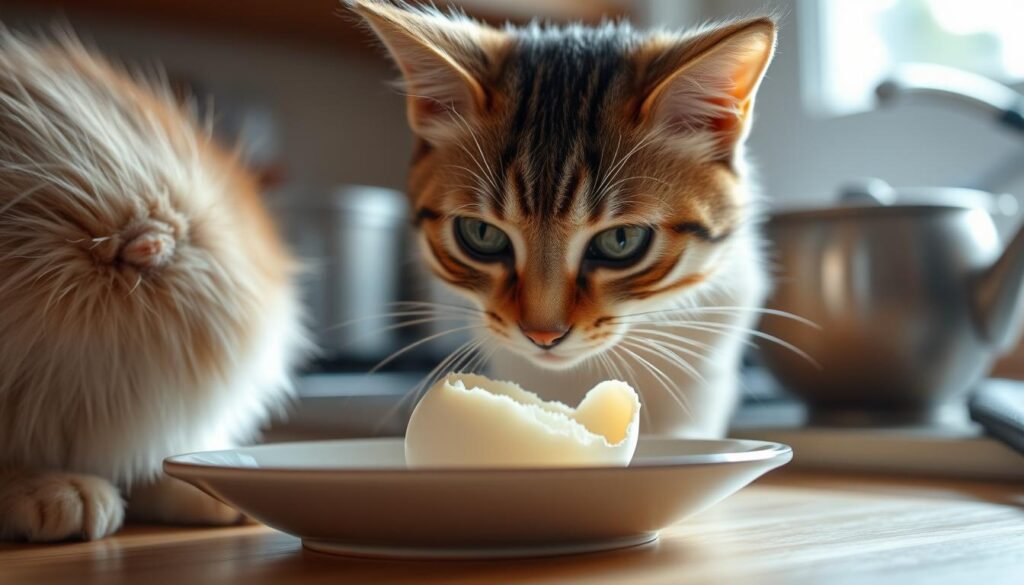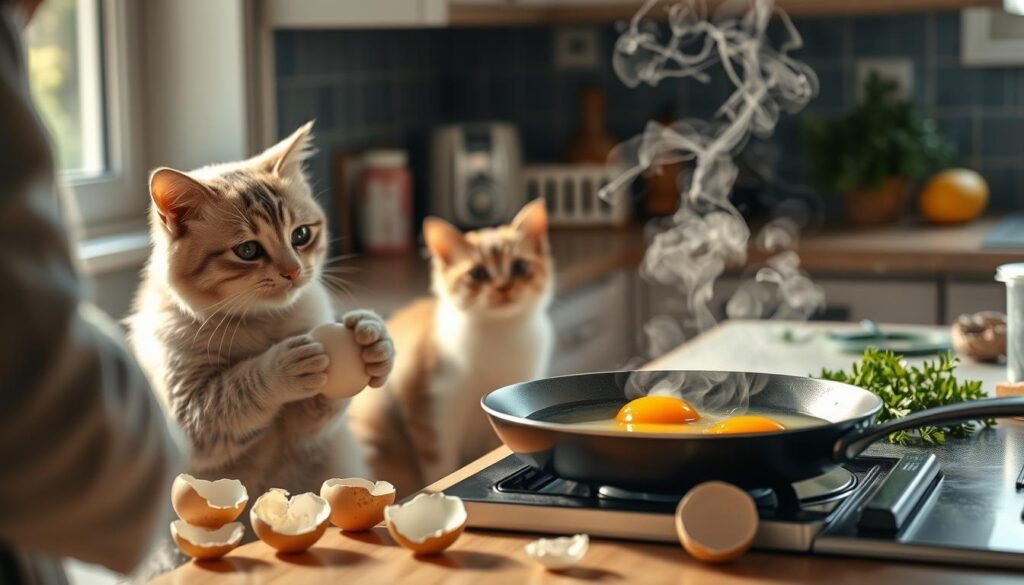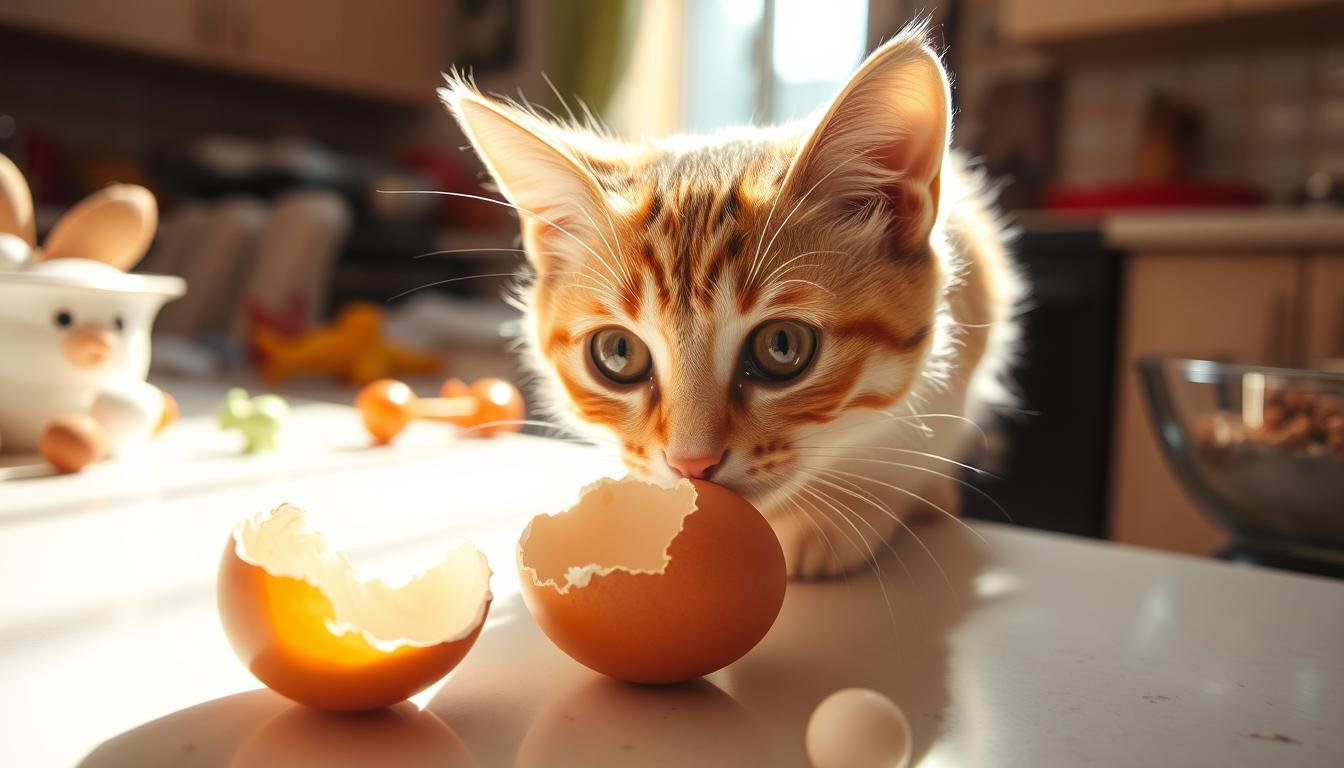As a cat owner, I often wonder what human foods are safe for my feline friend to eat. The question “can cats eat egg” is one I ask myself a lot. Many other cat owners do too. Cats and eggs can be a great mix, but knowing the benefits and risks is key.
It’s important to find out which foods are safe for cats. An egg diet can be a nutritious choice for them. But, understanding feline nutrition and health tips is crucial for their well-being.
Knowing the basics of can cats eat egg is vital. Cats and eggs can be a good pair, but we must consider the risks and benefits. Feline nutrition and health tips help ensure our cats are happy and healthy. An egg diet can provide the nutrients they need, but it must be done safely.
Key Takeaways
- Can cats eat egg is a common question among cat owners
- Cats and eggs can be a great combination, but it’s essential to understand the benefits and risks
- Safe foods for cats are crucial to their overall health
- An egg diet for cats can be a nutritious addition to their meal plan
- Feline nutrition and cat health tips are essential to ensuring our cats live happy and healthy lives
- Understanding the basics of can cats eat egg is vital to making informed decisions about our cat’s diet
Can Cats Eat Egg? The Basic Facts
As a cat owner, knowing about feline nutrition is key. Cats need a diet rich in animal protein. Eggs can be a good addition to their meals, but not the main course.
Eggs offer cats important protein and nutrients. But, they should only be given in small amounts. This keeps their diet balanced and avoids health problems. Here are some important tips:
- Start with small amounts to monitor your cat’s tolerance and digestive response.
- Choose cooked eggs over raw eggs to minimize the risk of salmonella and other bacterial contamination.
- Be aware of your cat’s individual nutritional needs and adjust the egg diet according to them.
By knowing these basics and following guidelines, you can add eggs to your cat’s diet wisely. This ensures they get the best nutrition.
Remember, a balanced diet is vital for your cat’s health. If you’re thinking about an egg diet or have questions, talk to your vet. They can give you advice on feline nutrition and health tips.
The Nutritional Benefits of Eggs for Cats
Eggs are packed with nutrients that can greatly benefit cats. As a cat owner, knowing the nutritional value of eggs is key. They are rich in protein, which is vital for strong muscles and health.
Cats on an egg diet get a lot of good stuff from eggs. They get essential amino acids, vitamins, and minerals. Eggs are a great source of vitamin D, vitamin B12, and iron. This makes them a fantastic addition to cat food.

- High-quality protein to support muscle growth and maintenance
- Essential vitamins and minerals, such as vitamin D and iron
- High digestibility, making them an excellent option for cats with sensitive stomachs
Adding eggs to your cat’s diet can be very beneficial. It’s important to know the benefits and risks of feeding eggs to cats. Whether as regular food or treats, eggs can support your cat’s health and well-being.
Raw vs. Cooked Eggs: Making the Right Choice
Feeding eggs to your cat can be a bit tricky. You might wonder if raw or cooked eggs are better. It’s important to think about the safety and nutrition of each choice. Raw eggs can have salmonella, but cooked eggs are safer. Yet, cooking can also lower their nutritional value, which is key for your cat’s health.
Let’s look at the good and bad of both raw and cooked eggs. Important things to consider include:
- Nutritional content: Raw eggs have more nutrients, but cooking kills salmonella.
- Food safety: Cooked eggs are safer, but raw eggs offer protein and other nutrients.
- Digestibility: Some cats may find raw eggs hard to digest, while others do well with them.
Choosing between raw or cooked eggs depends on your cat’s needs and your preferences. If you decide to give eggs, start with small amounts to avoid upset stomachs. This way, your cat can enjoy eggs’ benefits while avoiding raw egg risks.
When adding eggs to your cat’s diet, always put their health first. With some planning and research, you can give your cat a balanced diet. This can include safe human foods like cooked eggs.
Potential Risks and Health Concerns
As a cat owner, knowing the risks of eggs in your cat’s diet is key. Eggs can be good for your cat but also have risks. For example, egg allergies in cats can lead to mild skin issues or even life-threatening reactions.
When thinking about your cat’s feline diet, consider the risks of feeding cats eggs. Raw eggs can carry salmonella, which is dangerous for cats. Yet, cooked eggs can be a great source of protein and nutrients. Always cook eggs well before giving them to your cat.

Some cats might have allergic reactions to eggs. This can show up as vomiting, diarrhea, or skin problems. If your cat shows these signs after eating eggs, see your vet. They can suggest safer protein options for your cat’s kitty diet.
Besides allergies, egg consumption can be a problem for cats with high cholesterol. Keep an eye on your cat’s health and adjust their diet to meet their nutritional needs safely.
How to Prepare Eggs for Your Cat
Preparing eggs for your cat is important for their health. Eggs are a great source of protein, which is key for cats. Start by hard-boiling the eggs and then chop them into small pieces or scramble them.
Eggs are a nutritious addition to your cat’s diet. You can also add veggies or whole grains to make a balanced meal. Here are some tips for preparing eggs:
- Hard-boil the eggs for 10-12 minutes to ensure they are fully cooked
- Chop the eggs into small pieces to prevent choking hazards
- Scramble the eggs with a small amount of water or low-fat milk to add moisture
By following these tips, you can give your cat a nutritious meal. Always talk to your vet before changing your cat’s diet, including adding eggs.

With proper egg preparation and a balanced diet, your cat can thrive. Eggs can be a great addition to your cat’s meals. Just make sure to prepare them safely for the best nutritional benefits.
| Egg Preparation Method | Benefits |
|---|---|
| Hard-boiling | Easy to digest, rich in protein |
| Scrambling | Moisture-rich, can be mixed with other ingredients |
The Right Portion Size and Feeding Frequency
Feeding eggs to your cat needs careful thought about portion size and how often to feed. It’s important for their cat health. You want to make sure their dietary needs for cats are met. This includes knowing if can cats have eggs as part of their cat diet.
Think about your cat’s age, weight, and needs when deciding on portion size. Kittens need more protein, so they might get bigger portions. Senior cats might need smaller portions because of their age and health. It’s also key to know if is egg safe for cats and how often to give them.
Here are some general guidelines for portion sizes based on age:
- Kittens (0-12 months): 1-2 eggs per 10 pounds of body weight per day
- Adult cats (1-7 years): 1 egg per 10 pounds of body weight per day
- Senior cats (8+ years): 1/2 egg per 10 pounds of body weight per day
These are just general guidelines. The best way to find the right portion size for your cat is to talk to your vet. They can make a feeding plan that fits your cat’s dietary needs for cats and keeps them healthy.
| Age | Portion Size | Feeding Frequency |
|---|---|---|
| Kittens (0-12 months) | 1-2 eggs per 10 pounds of body weight | 2-3 times a day |
| Adult cats (1-7 years) | 1 egg per 10 pounds of body weight | 1-2 times a day |
| Senior cats (8+ years) | 1/2 egg per 10 pounds of body weight | 1 time a day |
Signs Your Cat May Not Tolerate Eggs
Thinking about adding eggs to my cat’s diet, I want to make sure they can handle them. Eggs are a great source of nutrition for cats, but some may have trouble digesting them. If your cat has diarrhea or vomits after eating eggs, it might mean they’re not tolerating them.
Eggs are good for cats, but introducing them slowly is key. This helps prevent any bad reactions. If your cat shows signs of an allergy, like itching, it’s time to see the vet.
Here are some signs your cat might not like eggs:
- Digestive issues, such as diarrhea or vomiting
- Allergic reactions, such as itching or scratching
- Changes in appetite or water intake
- Changes in stool quality or frequency
Choosing the right eggs is important for your cat’s health. Look for eggs that are full of nutrients but low in cholesterol. By adding eggs slowly, you can avoid any problems and make sure your cat gets the nutrients they need.
Incorporating Eggs into Your Cat’s Diet
As a cat owner, I’ve found that eggs can be a great addition to their food. They provide protein, vitamins, and minerals. It’s important to know the benefits and risks of eggs in a cat’s diet.
Mixing cooked eggs with their regular food is a good way to add eggs. This helps ensure they get the nutrients they need without digestive problems. Eggs can also be a tasty, healthy treat. But, remember, cats and humans have different nutritional needs.
- Mixing scrambled eggs with canned tuna or chicken
- Adding hard-boiled eggs to their regular meals
- Using eggs as a topping for their favorite wet food
These ideas make mealtime fun for my cat. Eggs help them get the nutrients they need to stay healthy.
Exploring the benefits of eggs in cat food reminds me to always check with my vet. They help me make sure my cat’s diet is balanced and includes eggs as a key part.
Conclusion: Making Informed Decisions About Feeding Eggs to Your Cat
Adding eggs to your cat’s feline diet can be good, but only if done safely. Eggs offer high-quality protein and important vitamins and minerals. But, it’s key to consider the risks and prepare eggs in a way that avoids health issues.
Deciding to give your cat eggs should involve talking to your vet. They can check what your cat needs and give advice just for them. By being informed and making educated choices about feeding eggs to your cat, you can help your cat eat well. This supports their health and happiness.

